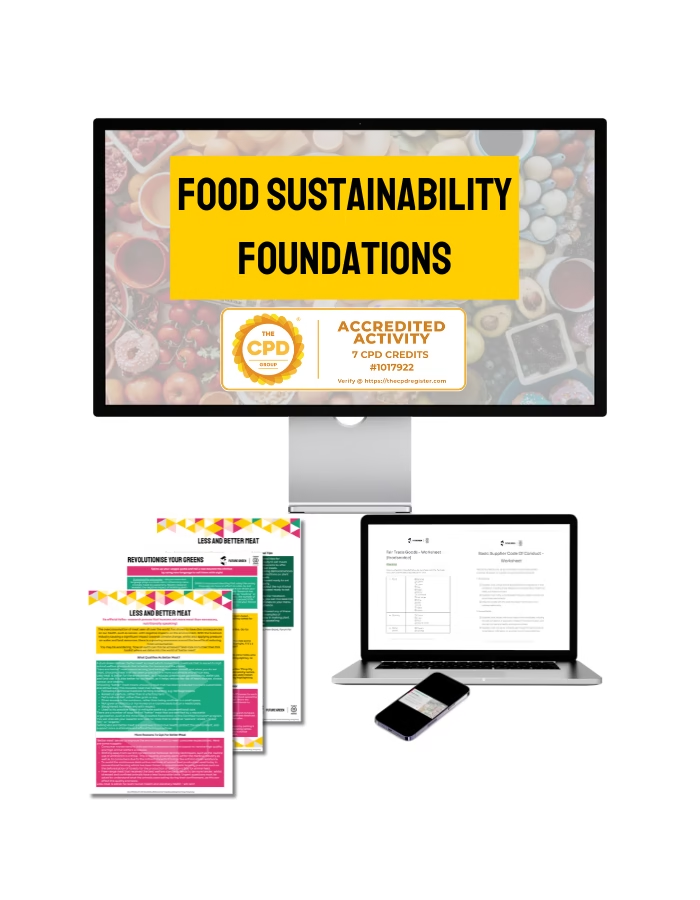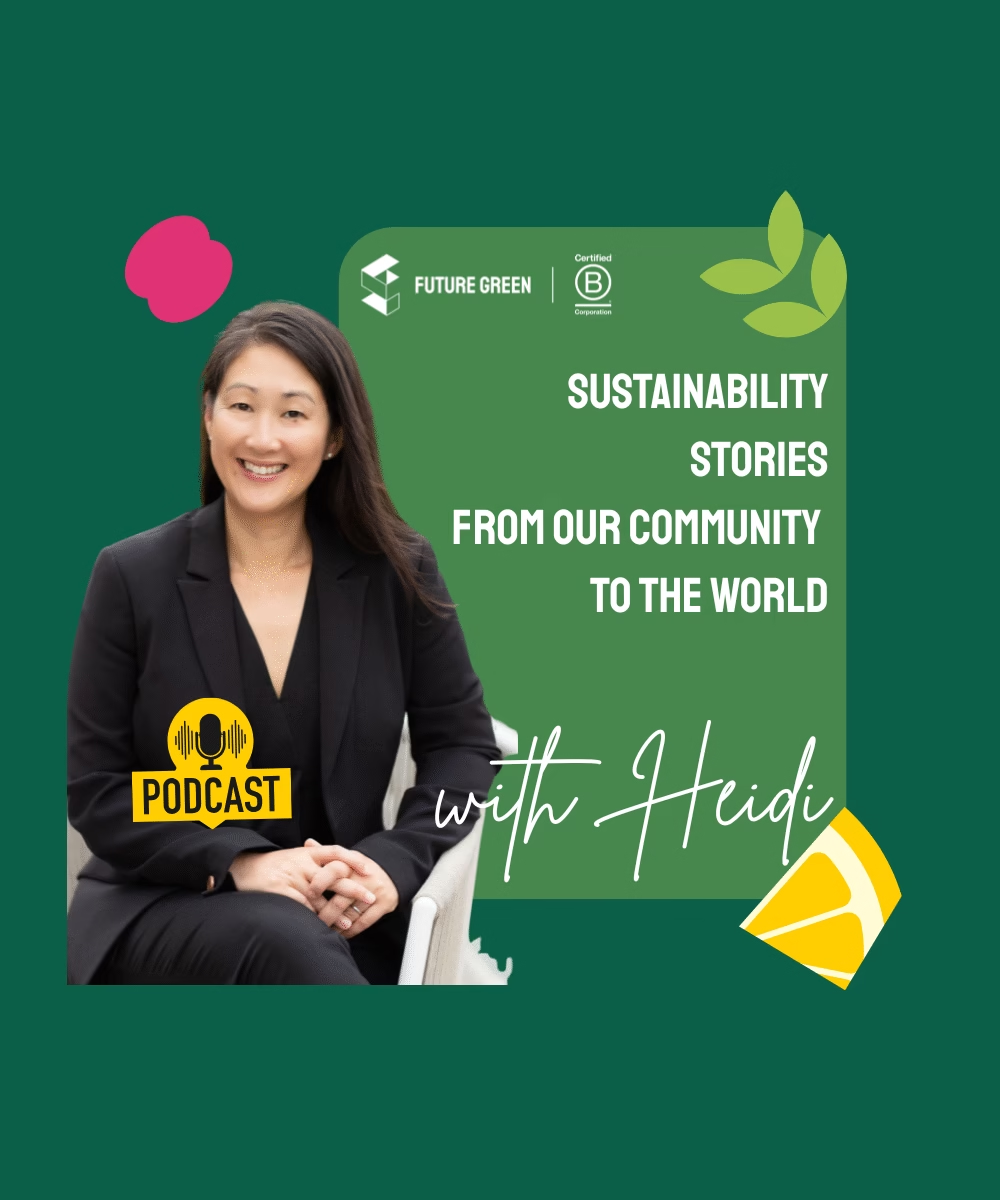FOOD SUSTAINABILITY CONSULTING & TRAINING
Food and Drink Professionals – Are you looking to transform your food procurement?
If so, you are in the right place, we at Future Green can help you acquire a minimum of 10 sustainable suppliers in 180 days via our Food Vision Sprint finally ensuring your procurement can properly shift for the better, and if we don’t deliver on these results, not a single dime is lost on your end.
Build your entire Food Vision Strategy with our canvas and beat your competition with a credible sustainability plan.
Brands we’ve worked with

The ultimate flashcard deck
For Food System Changemakers: Planet Possible
Our Future Green Flashcards are a beautifully designed, conversation-starting toolkit to help teams, educators, and changemakers explore what a sustainable food future really looks like.
Covers all 3 pillars of the Future Green framework:
 Procurement – e.g., ethical sourcing, deforestation-free commodities
Procurement – e.g., ethical sourcing, deforestation-free commodities Environment – e.g., biodiversity, healthy soils, food waste reduction
Environment – e.g., biodiversity, healthy soils, food waste reduction Society – e.g., fair labour, nutrition equity, inclusive food access
Society – e.g., fair labour, nutrition equity, inclusive food access
Whether you’re running a workshop, teaching sustainability, or activating your team—this deck turns strategy into interaction.
Get your own deck today!

CPD-CERTIFIED FOOD SUSTAINABILITY COURSE
If you are a food professional looking to pivot your career towards sustainability…
Then dive into the world of sustainability through our online, self paced CPD-certified course! You won’t regret it!
You’ll learn about how to:
- Use sustainability standards credibly
- Save money through improved waste and energy management
- Capture sustainability minded customers
- Leverage the science e.g. the link between human health and planetary health to avoid greenwashing
On completing our CPD-certified course, you will earn a certificate from Future Green to proudly showcase your expertise as the go-to food sustainability expert in your company.
Upskill today so that you can get that new job!

Introducing the Food Vision Programme
Stop Losing Contracts. Start Winning with Sustainability.
Vague policies and weak answers to ESG questions are costing food businesses deals, credibility, and growth. Clients expect more. Competitors are stepping up.
The Food Vision Programme is an intensive 8-week sprint that turns sustainability from a liability into your advantage. Built for food teams across operations, sales, catering, procurement, and leadership — it gives you the roadmap, the message, and the confidence to win.
In just 8 weeks, you will:
✅ Build a clear, credible Food Sustainability Roadmap
✅ Align your team around one North Star vision
✅ Prioritise action areas that matter to clients
✅ Communicate sustainability with power in pitches, tenders, and boardrooms
This isn’t theory. This is execution.

Carbon Literacy Course for Food and Drinks Businesses
Make a Real Impact on Climate Change with Future Green – Carbon Literacy for the Global Food Sector 🌍
Empower yourself with the knowledge, skills, and motivation to address climate change through our certified online course. In just two half-days of interactive learning with Future Green, gain the tools to implement meaningful, sustainable changes.
Upcoming Training Dates:
📅 2025
- 11 & 13 Feb
- 22 & 24 Apr
- 23 & 25 Sep
- 19 & 21 Nov
Learn to:
✅ Understand carbon footprints and mitigation strategies.
✅ Align your organisation’s goals with sustainability initiatives.
✅ Inspire your team to lead climate-conscious practices.
With flexible packages, this course is perfect for individuals, teams, and businesses ready to champion a sustainable future. Be part of the 100,000+ Carbon Literate individuals worldwide!

Your Voice Matters. Let’s Share It.
We’ve launched the Future Green Community Podcast Series to showcase our members’ insights, journeys, and innovations shaping sustainability.
It’s your platform to be heard, connect with like-minded leaders, and inspire action.
👉 Checkout our podcast here.
Want to be part of the conversation? Join the Future Green Community and amplify your impact across our growing network.

Want Us to Organise Your Next Event?
🌍 From Conferences to Members Monthly Meetups, Roundtables, Lunch & Learns or Sports Events – we design experiences that inspire action.
Catch a glimpse of one of our past events to get a taste:
UnConference 3.0 returned – and it was powerful.
The future of food was on the table as changemakers gathered to co-create sustainable solutions.
Here’s a taste of what we deliver:
🌿 Curated Tracks of Action – tackling food waste, cutting emissions, and more
🛠 Hands-On Workshops – experts and participants designing real solutions
🤝 Networking that Matters – connecting pioneers in climate and food systems
🥗 Sustainable Food Experiences – plant-based, carbon-labelled meals that walk the talk
Whether it’s a conference, a Members Monthly Meetup, a roundtable, a lunch & Learn, hyping up a sports event or something tailored just for your team, we bring people together to spark collaboration and drive impact.
Want us to host your next sustainability-minded event?

At Future Green, we help food companies design strategies that make their business greener, less polluting, and more restorative, with action-oriented roadmaps that are truly fit for purpose.
What’s your food vision?

Globally agreed food systems frameworks
We turn global sustainability ambitions into local action. Using design thinking tools, we help you align strategies, future-proof your business, and make impact where it matters most.

How sustainable is your menu? get your assessement straightaway
How we bring food sustainability to life…
Start today. No matter where you are on your sustainability journey, be that starting out, making progress, or a leader, there is more you can do. Kick off with our Strategy Sprint Workshop to align teams around your focus areas. We will support you in designing a roadmap with identified challenges, prioritised solutions and an action plan.
Book a Discovery call with Heidi, Future Green’s founder and CEO.
“Our University prides itself in our aggressive approach to sustainability, meaning we set difficult targets and then challenge ourselves to develop creative solutions. The collaboration fits our vision perfectly and helps us develop sustainability KPIs for our F&B outlets that are meaningful, measurable, and transparent.”
Prof. Davis Bookhart
Hong Kong University of Science and Technology

“We support anyone who sells food…F&B, schools, retailers, corporations and government institutions to procure food sustainably.” Sharing knowledge and solutions about sustainable food systems is urgently needed and we provide that in a credible, engaging and compelling way!
Heidi Spurrell, Founder and CEO































































































